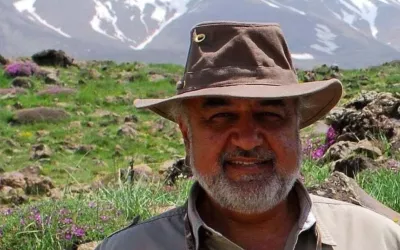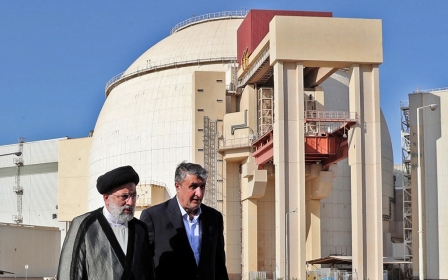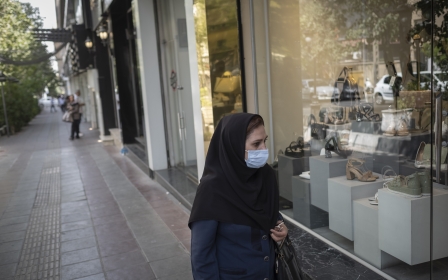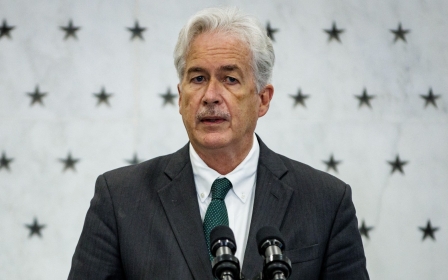Iranian press review: 95 percent of region's largest saltwater lake dries up

Last days of Lake Urmia
Lake Urmia, once the largest saltwater lake in the Middle East, is on the verge of drying up entirely, having lost 95 percent of its volume, local media has reported.
On Monday, the Iranian Students' News Agency (ISNA) published a photo essay showing the dried lake bed and the impact of the environmental disaster occurring at this Unesco-registered biosphere reserve.
"Total death is threatening Lake Urmia, and if this environmental disaster happens, cities in northern and central Iran will encounter salt winds and [dust] storms," ISNA wrote.
According to ISNA, the current situation was caused mostly by people using the lake's water for agriculture and the halting of projects that aimed to provide water to the lake from other sources.
Lake Urmia was an essential habitat for migratory birds and Artemia, a type of aquatic crustacean commonly known as brine shrimp. The lake, located in the northwestern Iranian Azerbaijan province, also played a vital role in western Iran as a recreational and cultural resource.
In recent years, officials have blamed drought and climate change for the decline of Lake Urmia. However, experts suggest that water mismanagement, the building of several dams on the rivers feeding the lake, and the construction of a highway in the middle of the lake were some of the main reasons for its death.
Changes to Iran's diplomatic team
After two months of speculation about a reshuffle among the Iranian diplomatic corps, eight conservative politicians have joined Iran's main team, the Khorasan daily reported.
Analysts said the new diplomats' appointments were part of a move to strengthen Iran's anti-western stances amid a deadlock in nuclear talks with world powers.
On Sunday, President Ebrahim Raisi appointed Saeed Iravani as Iran's new ambassador to the United Nations. Ali Bahraini was appointed as the country's permanent representative to the UN office and other international organisations in Geneva.
Six conservative diplomats were appointed as ambassadors to Lebanon, India, Poland, Czech Republic, Georgia and Sierra Leone.
Iravani's appointment drew plenty of attention, due to his close ties with the country's security organisations and top brass commanders at the Islamic Revolutionary Guard Corps (IRGC).
He also served in Baghdad as Iran's chargé d'affaires and led the current talks to restore political ties between Tehran and Riyadh.
The appointment of Mojtaba Amani as Iran's new envoy to Lebanon is also of great importance, as Iranian ambassadors to Iraq, Lebanon and Syria are usually hand-picked from the circle of politicians close to the Quds force, the IRGC branch operating in foreign countries.
Amani, a staunch supporter of confrontation with Israel, was the head of Iran's interest section in Egypt.
Sources in Tehran also reported that about 40 other ambassadors would change post in the coming weeks.
Conservative IRGC whistleblower jailed
A preliminary court has handed down a two-year prison sentence to Vahid Ashtari, an IRGC-linked journalist and member of the Basij paramilitary organisation, who had revealed various corruption cases among high-ranking IRGC commanders.
On Twitter, Ashtari published the court verdict details, in which he was accused of "spreading lies" through "disparaging and weakening the figures of the revolution front".
In a series of tweets, he also wrote about the investigation and trial process he went through, clarifying examples of injustice in the judicial system.
"Those who have not appeared before our country's courts might not believe this, but [sometimes] the accused might not even know for which crime the judge is trying him… and the accused should investigate himself and find out the new crime that the judge had made up for him," he wrote on Twitter.
Ashtari has been an outspoken member of a conservative political movement known as Edalatkhah, or "justice seeker". Some political analysts suggest factions of the IRGC are behind the movement, providing information to whistleblowers to attack their rival IRGC members.
Trafficked wheat finds market in Iraq
Iranian legislator Jalal Mahmoudzadeh has revealed that wheat produced in Iran is smuggled to neighbouring Iraq and sold at a price about 70 percent higher than what the Iranian government pays for the product to its farmers, the Fararu news agency reports.
According to Mahmoudzadeh, one kilogram of Iranian wheat is sold for 180,000 Iranian rials in Iraq, while the Iranian government pays 115,000 rials per kilo to the farmers. The MP added that the government delayed paying its debts to local wheat producers, encouraging the farmers to sell their products to traffickers and middlemen.
"If this situation continues, the government would be capable of buying only 6m tonnes of wheat, while the country needs 13m tonnes," he was quoted as saying.
Mahmoudzadeh stressed that Iran would be obliged to buy 7m tonnes of wheat from foreign suppliers at a higher price, amid an international shortage due to the war in Ukraine.
His comments came after the government had already increased the price of wheat in May, in an attempt to stop wheat and flour trafficking to neighbouring countries. That plan not only stopped the grain trafficking but also hugely impacted the country's inflation, hitting people's purchasing power.
Middle East Eye propose une couverture et une analyse indépendantes et incomparables du Moyen-Orient, de l’Afrique du Nord et d’autres régions du monde. Pour en savoir plus sur la reprise de ce contenu et les frais qui s’appliquent, veuillez remplir ce formulaire [en anglais]. Pour en savoir plus sur MEE, cliquez ici [en anglais].





